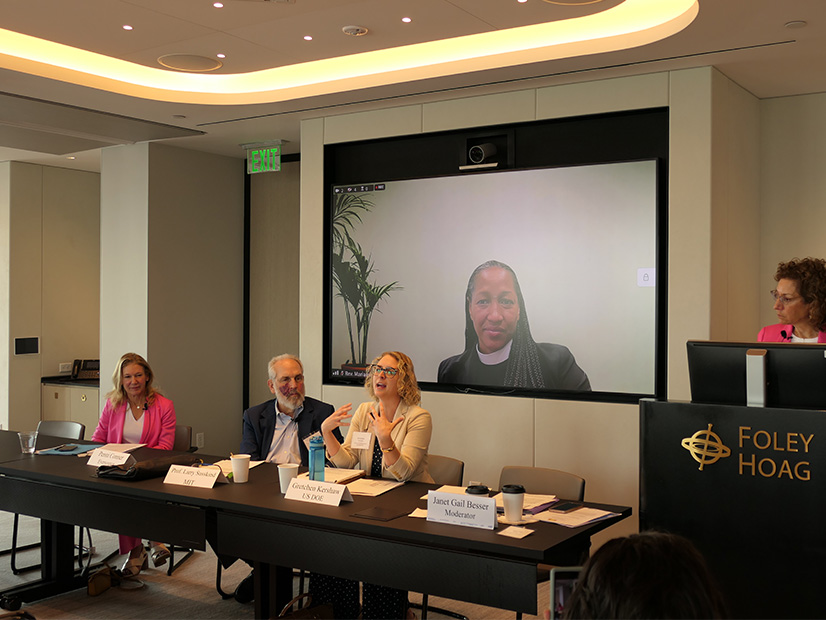
BOSTON — Early and meaningful engagement with host communities will be an essential component of expediting energy permitting and siting processes, panelists said at Raab Associates’ New England Electricity Restructuring Roundtable on June 14.
“We are in a change-or-die moment,” said the Rev. Mariama White-Hammond, former chief of energy, environment and open space for the city of Boston, adding that the pace of clean energy deployment must accelerate rapidly to meet the need to decarbonize.
To meet the moment, utilities and project developers will need to collaborate with many of the communities and organizations they fought in the past, she said.
“There is a question of who will hold the power,” White-Hammond said. “Will it be the technocrats, investors and government officials, or will it be all of us?”
Ultimately, developers will face significant backlash if they try to force through projects without incorporating community input in the decision-making process, White-Hammond added.
Penni McLean-Conner of Eversource Energy echoed the need to work with communities in the early stages of project development and consider community input when weighing the tradeoffs of project alternatives.
“Eversource is committed to an enhanced community-centric approach,” McLean-Conner said, adding that the company hopes new energy facilities can be seen as opportunities rather than burdens by residents.
One key to changing this conversation is understanding and respecting the historical inequities faced by these communities, McLean-Conner added.
“We can’t assume we know or have all the answers,” she said. “We need to incorporate their shared experiences and unique perspectives into our thinking going forward.”
Larry Susskind, professor of urban and environmental planning at MIT, said project developers should work with a range of stakeholder representatives and organizations to reach “informed consensus” within a “confidential space for joint fact-finding and collaborative problem-solving.”
Once developers identify the unique needs and concerns of a host community, they should negotiate and sign binding community benefit agreements they submit to the state during the permitting process, Susskind said.
Getting community benefit agreements right is “as much about compensation as it is about mitigation,” Susskind said, adding that “we need to think in terms of bartering to create benefits, not just minimizing costs.”
Permitting and siting has been a major topic of conversation for Massachusetts lawmakers over the past few months, with key legislators indicating it’s a top priority for a potential climate bill they hope to pass by the end of the current session in July.
Legislative leaders of the House and Senate have been working with the Healey administration to develop a compromise bill that likely will revolve around the recent recommendations of the state’s Commission on Energy Infrastructure Siting and Permitting. (See Mass. Commission Issues Recs on Energy Project Siting, Permitting.)
The Massachusetts Senate plans to take up a climate bill centered around permitting and siting reform this week.
The state commission recommended consolidating state and local permitting and siting processes and requiring authorities to issue permits within 15 months of verifying that an application is complete.
Michael Judge, undersecretary of energy at the Massachusetts Office of Energy and Environmental Affairs, said the state’s Energy Facilities Siting Board (EFSB) historically has taken between one and four years to approve a project, “after which the project still needs to get all other permits.”
“This isn’t working for anyone,” Judge said, adding the state is unlikely to meet its climate mandates without permitting reform.
Adam Chapdelaine, CEO of the Massachusetts Municipal Association, which represents the state’s 351 cities and towns, expressed his “concern about getting consolidated permitting right” while preserving the rights and role of municipalities.
He recommended initially adopting an opt-in consolidated local permitting program to inform the consideration of statewide reforms to local permitting.
In response, Judge emphasized that, under the commission’s proposal, local permitting would remain under local control but would need to be expedited and consolidated under one permit parallel to the EFSB approval process.
He said making the local permitting reforms optional could lead to an “inconsistent framework” for smaller projects that are subject only to local permitting, potentially creating longer timelines for some smaller projects.



